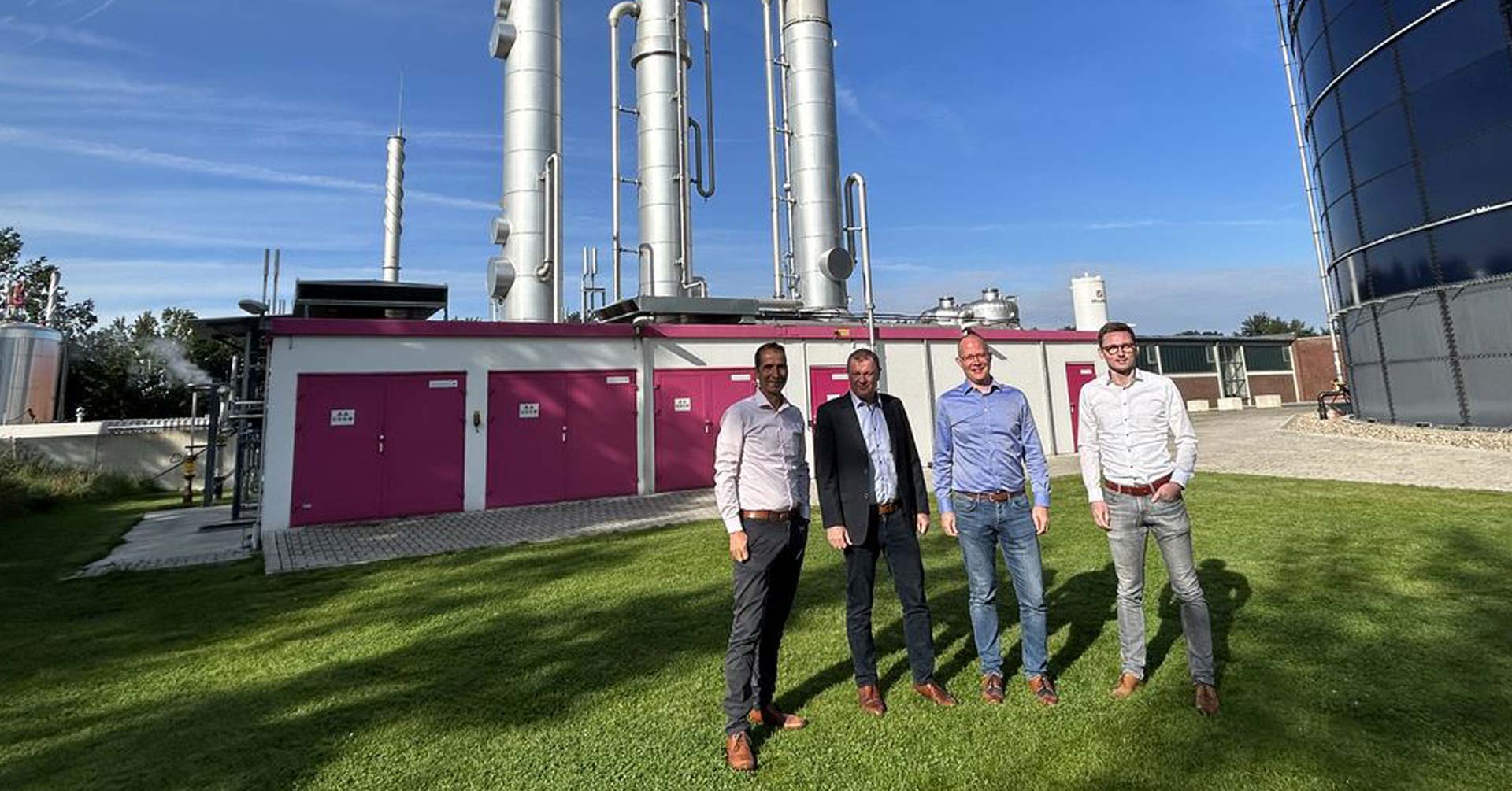
MEP Pieper (CDU) in discussion with Westfalen AG and Münster-based revis
DÜLMEN For sustainable mobility with climate-friendly fuels, it is necessary to create long-term, Europe-wide legal standards.
Only then will it be possible to establish bio-LNG and bio-CNG gases produced from residual materials as fuels in the transport sector in the long term.
Markus Pieper (CDU), Member of the European Parliament for the Münster region, recently visited the modern biomethane plant operated by revis bioenergy in Dülmen to find out how this can be achieved from the perspective of fuel producers and users.
Pieper was invited by revis bioenergy, which is currently building one of the world’s largest plants for the production of bio-LNG and bio-CNG in the district of Cloppenburg, together with Westfalen AG.
The companies are working together strategically with regard to the use of bio-LNG.
Markus Pieper is the rapporteur for the EU Parliament’s Renewable Energy Directive (RED) and is playing a leading role in shaping the energy transition at European level. Bio-CNG and bio-LNG are pushing onto the market At the meeting, the company representatives agreed with Pieper that there is no alternative to an open technology for a wide variety of drive types when it comes to the mobility of the future.
Simon Detscher, Managing Director of revis bioenergy GmbH, made it clear that the conditions for the industrial and economic production of sustainable fuels from residual materials are now in place and that considerableCO2 savings are already possible in the transport sector today.
Residual materials from which these fuels are produced are now available throughout Europe.
Detscher: “Bio-CNG and bio-LNG are now established solutions. More and more companies are making the conscious decision to invest in these sustainable fuels and convert their fleets accordingly.” Climate-friendly fuels as an economical alternative The revis CEO’s statements were backed up by Felix Zwingmann, Head of Supply Chain Management Service Stations at Westfalen AG.
“More and more haulage companies are consciously deciding to convert their fleets to bio-CNG trucks and bio-LNG trucks, as these drive types are reliable, economical and, above all, sustainable,” said Zwingmann.
The use of these alternatives leads to immediateCO2 savings and offers an economic advantage for companies. Criticism: there is no reliable long-term legal framework Despite all the confidence, Pieper also received constructive suggestions from the companies.
Julian Janocha, Head of Gas Mobility at Westfalen AG: “Innovative partners such as revis, who are prepared to invest in projects for the industrial production of fuels, are the basis for climate-friendly mobility. However, we and revis currently lack a long-term framework for action, which is essential for strategic developments and partnerships.” More investment security needed for new technologies The company representatives pointed out that it is necessary to turn the current national standards into binding requirements at European level well into the next decade. Tim van Bevern, project developer at revis bioenergy: “Only an international standardization of certification requirements for renewable energies ensures compliance with the strictest sustainability criteria and creates a level playing field worldwide.”
Corresponding regulations would ensure planning security beyond 2030 and thus provide the necessary investment security for producers and customers. Pieper: prime example of innovative and regional networking Pieper assured the companies that he would take up the demand for clear regulations.
It is important that companies seek continuous dialog with politicians.
“The exchange of experience is particularly important when it comes to questions of environmentally friendly mobility as one of the central issues of the energy and climate transition,” said Pieper, who has represented the region in Brussels since 2004.
For him, the cooperation between revis and Westfalen AG is a prime example of innovative and, above all, regional networking: “This type of cooperation is the best proof of the economic strength and innovative capacity of the Münster region,” says Pieper. Background revis bioenergy GmbH: revis bioenergy GmbH from Münster specializes in all aspects of the production of green fuels, particularly from biomethane.
The know-how acquired over the years covers all services from plant design, substrate procurement and utilization to the marketing of green fuels and all by-products.
Among other things, the company is currently building Europe’s largest plant for biomethane production from manure.
The plant, which revis developed entirely in-house, is located at the c-Port on the Küstenkanal in the district of Cloppenburg.
Commissioning by nordfuel GmbH is scheduled for 2023. Background Westfalen AG: 100 years of expertise: The Westfalen Group is active in the fields of technical gases, cooling and heating, filling stations and mobility as well as respiratory home therapy.
With its products and services, the company is increasingly offering solutions that help customers to become more sustainable.
Hydrogen as an energy source is playing a particularly important role in more and more areas.
Founded in Münster in 1923, the family-owned company is now represented by numerous subsidiaries and associated companies at over 20 production sites in Germany, the Netherlands, Belgium, France, Switzerland and Austria.
In the 2022 financial year, the company generated sales of around 2.3 billion euros with around 2,000 employees. Contact revis: revis bioenergy GmbH Tim van Bevern T +49 (0) 251 – 60 98 45 18t.vanbevern@revis-bioenergy.deAnsprechpartner Westfalen: Westfalen AG Kamil Glabica T +49 (0) 251 – 695-6308 k.glabica@westfalen.com


